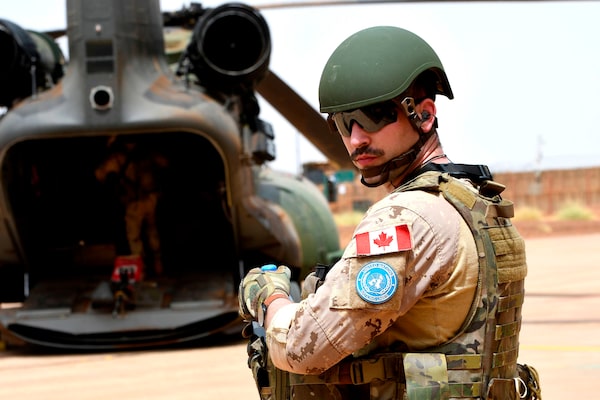
A Canadian United Nations soldier prepares to move out of a base in Gao, Mali on Aug. 1, 2018, to take part in an operation during the United Nations Multidimensional Integrated Stabilization Mission in Mali.SEYLLOU/AFP/Getty Images
Some time in the next few weeks, the last remaining Canadian peacekeepers in northern Mali will pack up and begin their long journey home. It will bring a symbolic end to a strategy that failed to solve the country’s worsening violence or its anti-democratic drift.
The United Nations has already begun dismantling its bases in the West African country, shipping out thousands of armoured vehicles and weapons. Among the abandoned outposts will be the sprawling base in the city of Gao where 250 Canadians were deployed for a year with a fleet of eight Canadian helicopters.
In 2018, when Canada launched its mission in northern Mali’s windswept deserts, Canadian officials said the troops would “create a safer, more peaceful world.”
Instead the crisis in Mali – and the neighbouring countries of the Sahel region – has trended in the opposite direction for several years now. Military officers have seized power in coups. Insurgent militias have expanded their territory. Deaths and human-rights abuses have escalated. Democracy has receded.
The UN decided to pull its peacekeepers out of Mali after the military regime told it to leave this year. Mali’s junta prefers to obtain its security assistance from Russian mercenaries, even though the Russians have been widely implicated in massacres of civilians and other atrocities in the country.
The UN base in Gao, once home to the Canadian troops, is expected to be taken over by Mali’s army – which potentially opens the door for its Russian allies to install themselves there.
The departure of the UN peacekeepers by the end of December is part of a larger international pullback from Mali, Niger and Burkina Faso. Hostile military regimes are now in command in all three countries. France, the biggest Western power in the region, has become the main target for a wave of populist anger. It announced this week that it will withdraw its troops from Niger by December, after its similar departure from Mali and Burkina Faso.
The pullouts are a particular blow to Canada, which had focused much of its Africa strategy on Mali – and its Sahel neighbours – for decades. Over the past 20 years, Canada has provided nearly $2.9-billion in development aid to the three countries. Mali was one of the biggest African recipients of Canadian aid, with more than $1.7-billion in development assistance since 2000, plus millions more in security aid. Canada also spent millions on military training in the region, and Canadian mining companies have been among the biggest private investors in the Sahel.
Despite these financial commitments, and despite its key role in the 2011 military intervention in Libya that has helped fuel the Sahel’s instability, Canada took a largely passive role in the region after 2011, critics say.
“Canada’s high-level political attention to the Sahel over the last decade has appeared relatively weak,” said Chris Roberts, a University of Calgary political scientist and Africa specialist.
“As always, Canada let the French and the Americans take the Western lead in the region, despite its significant economic interests – often greater than France or the U.S. in specific countries.”
Bruno Charbonneau, director of the Centre for Security and Crisis Governance at the Royal Military College Saint-Jean in Quebec, said the Canadian government was too “risk-averse” to accept a leadership role in the Mali peacekeeping mission – even though the UN and several countries were hoping Canada would step up.
“Maybe it would not have changed much, but in a leadership position Canada could have promoted and supported another vision of the peace process that relied less on the French and their counterterrorism-heavy strategy,” Prof. Charbonneau said.
“Canada could have positioned as a sort of buffer between France and African countries, avoiding or weakening anti-French populism,” he said. “The counterterrorist operations were counterproductive and undermined the UN peacebuilding work.”
After the coups in the three Sahel countries, Canada froze its bilateral aid to the governments of Mali, Niger and Burkina Faso. But it planned to keep supporting the UN peacekeeping mission – until the UN opted to leave.
Jessica Lamirande, a spokesperson for Canada’s Department of National Defence, said there are currently five Canadian Armed Forces members in the UN mission in Mali, known as MINUSMA. All five will be withdrawn by the end of December, she said.
Sergeant Kim Chamberland, an RCMP spokesperson, said three Canadian police officers were still in the UN mission in Mali as of this month. “All Canadian police officers deployed to MINUSMA are planned to be back in Canada by the time the UN winds down the mission,” she said.
Dismantling the dozen UN bases and withdrawing thousands of peacekeepers by the end of December is a mammoth task. The UN estimates that it will need to ship out nearly 4,000 vehicles and 5,500 sea containers of equipment. It had 15,000 personnel in Mali at its peak.
The departure of the peacekeepers will leave Mali increasingly vulnerable to violence by jihadists. Attacks by Islamist militias in northern Mali are already reported to have doubled since the UN completed the first stage of its withdrawal last month.
“Human-rights abuses and atrocities by Malian government forces, the mercenary forces and rebel groups are bound to increase without the UN presence,” said Walter Dorn, professor of defence studies at Royal Military College and the Canadian Forces College.
“It is understandable that France and other governments do not want to support an illegitimate government, but we have to think of the Malian population, which will be further victimized in the absence of the UN operation.”
The UN Security Council could have resisted the Malian coup leaders when they demanded the withdrawal of the peacekeepers, Prof. Dorn said. “The Security Council decision was made precipitously,” he said.